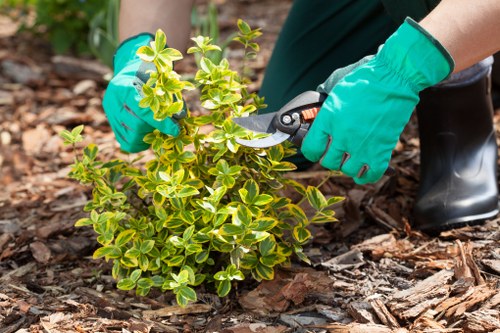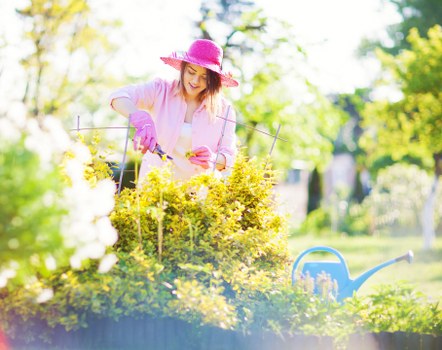Hedge Trimming Aldgate: Keeping Your Garden Pristine

A well-maintained hedge not only enhances the aesthetic appeal of your garden but also provides privacy and serves as a natural barrier against noise. In Aldgate, where urban living meets suburban tranquility, keeping your hedges in top shape is essential for both property value and personal enjoyment.
Hedge trimming in Aldgate requires a blend of skill, knowledge, and the right tools. Whether you're a homeowner looking to maintain your garden or a professional gardener offering services in Aldgate, understanding the nuances of hedge trimming can make a significant difference.
This article delves into the best practices, tools, and seasonal considerations for hedge trimming in Aldgate, ensuring your green spaces remain beautiful year-round.
Why Hedge Trimming is Important

Regular hedge trimming offers numerous benefits that extend beyond mere appearance. Here are some key reasons why hedge trimming is crucial:
- Health of the Plants: Trimming helps remove dead or diseased branches, promoting healthier growth.
- Shape and Structure: Maintaining a consistent shape ensures the hedge grows uniformly and remains attractive.
- Privacy: Well-trimmed hedges provide effective privacy screens, essential for urban settings like Aldgate.
- Safety: Removing overgrown branches can prevent potential hazards, especially near walkways and properties.
In Aldgate's climate, which can vary from mild winters to warm summers, regular trimming helps hedges withstand seasonal changes and reduces the risk of storm damage.
Essential Tools for Hedge Trimming

Having the right tools is fundamental to effective hedge trimming. Below is a list of essential tools every gardener in Aldgate should consider:
- Hedge Trimmers: Electric or petrol-powered trimmers are ideal for large hedges, providing clean and precise cuts.
- Pruning Shears: Suitable for smaller branches and detailed work, pruning shears offer control and accuracy.
- Loppers: For thicker branches that standard pruning shears can't handle, loppers are indispensable.
- Gloves: Protect your hands from scratches, thorns, and debris during trimming.
- Safety Goggles: Ensuring eye protection is crucial, especially when using power tools.
Investing in high-quality tools not only makes hedge trimming easier but also ensures the longevity of your equipment, saving you time and money in the long run.
Best Practices for Hedge Trimming

Adhering to best practices ensures that hedge trimming is effective and does not harm the plants. Here are some guidelines to follow:
- Timing: The best time to trim hedges is during late winter or early spring before new growth begins. However, light trimming can be done in summer as needed.
- Technique: Use sharp tools to make clean cuts. Avoid tearing or crushing branches, which can lead to disease.
- Shape: Maintain a natural shape that complements your garden. Avoid over-trimming, which can stress the plant.
- Height Maintenance: Keep hedges at a consistent height to ensure uniform growth and appearance.
- Regular Maintenance: Schedule regular trimming sessions to prevent hedges from becoming overgrown and unmanageable.
Following these practices not only keeps your hedges looking their best but also promotes healthy growth and longevity.
Seasonal Hedge Trimming in Aldgate

Hedge trimming is not a one-time task but an ongoing process that varies with the seasons. Understanding the seasonal needs of your hedges in Aldgate ensures they remain healthy and vibrant throughout the year.
Spring Trimming
Spring is an ideal time for major hedge trimming. As plants come out of dormancy, trimming encourages new growth and helps shape the hedge for the coming year.
Summer Trimming
During summer, focus on light trimming to remove any vigorous growth and maintain the shape of the hedge. This helps prevent the hedge from becoming unruly in the heat.
Autumn Trimming
Autumn trimming involves cleaning up any fallen leaves or debris and making sure the hedge is tidy before the winter months. It’s also a good time to inspect for any damage caused by storms.
Winter Trimming
While heavy trimming in winter is not recommended, light trimming can be done to remove any dead or damaged branches. Ensure that hedges are well-maintained to withstand the colder temperatures.
Choosing the Right Hedge for Your Aldgate Garden
Selecting the appropriate hedge species is crucial for the success of your garden in Aldgate. Factors such as climate, soil type, and the desired level of maintenance play a significant role in this decision.
- Boxwood: A popular choice for formal gardens, boxwood hedges are dense and easy to shape but require regular maintenance.
- Privet: Known for its fast growth, privet is ideal for creating quick privacy screens. It responds well to heavy pruning.
- Laurel: Laurel hedges are evergreen, providing year-round greenery. They are robust and tolerant of trimming.
- Holly: Holly hedges add a touch of elegance with their spiky leaves and bright berries. They require minimal trimming.
- Yew: Yews are versatile and can be shaped into various forms. They are long-lived and resilient.
Consider the specific requirements and characteristics of each hedge type to choose the one that best fits your garden’s needs and your maintenance capabilities.
Local Regulations and Permits in Aldgate
Before undertaking any significant hedge trimming project in Aldgate, it's essential to be aware of local regulations and permits. Aldgate, like many communities, may have specific guidelines regarding the height and type of hedges allowed, especially in residential areas.
- Height Restrictions: Some areas may have restrictions on the maximum height your hedge can reach, particularly along property boundaries.
- Protected Species: Certain hedge species might be protected, requiring special permissions for trimming or removal.
- Noise Ordinances: If you're using power tools for trimming, be mindful of local noise regulations to avoid disturbances.
- Safety Standards: Ensure that your trimming practices comply with safety standards to prevent accidents and injuries.
Contact the Aldgate municipal office or local gardening associations to get detailed information about any permits or regulations you need to adhere to before beginning your hedge trimming project.
Hiring Professional Hedge Trimmers in Aldgate
While DIY hedge trimming is feasible for many, hiring professionals in Aldgate can offer several advantages, especially for larger or more complex gardens.
- Expertise: Professional hedge trimmers have the experience and knowledge to handle various hedge types and trimming techniques effectively.
- Time-Saving: Hiring a professional saves you valuable time, allowing you to focus on other aspects of gardening or personal activities.
- Quality Results: Professionals ensure clean, precise cuts that promote the health and aesthetics of your hedges.
- Safety: Trimming hedges, especially tall or dense ones, can be hazardous. Professionals are trained to manage these risks safely.
- Equipment: Professionals come equipped with the necessary tools and machinery, eliminating the need for you to invest in expensive equipment.
When selecting a professional service in Aldgate, consider factors such as reputation, customer reviews, pricing, and the range of services offered to ensure you choose the best fit for your needs.
Cost of Hedge Trimming in Aldgate
The cost of hedge trimming in Aldgate can vary based on several factors, including the size and type of the hedge, the complexity of the job, and whether you choose to do it yourself or hire a professional.
- DIY Trimming: Costs are mainly associated with purchasing or renting tools. For small to medium-sized hedges, this can be a cost-effective option.
- Professional Services: Hiring a professional can range from £30 to £60 per hour, depending on the scope of the work and the provider.
- Additional Costs: Removal of clippings, disposal fees, and any necessary repairs to tools can add to the overall cost.
It's advisable to obtain multiple quotes from local professionals in Aldgate to compare prices and services. Additionally, scheduling regular trims can help manage costs by preventing the need for more extensive work in the future.
Environmental Considerations
Hedge trimming in Aldgate should also take into account environmental factors to ensure sustainable gardening practices.
- Waste Disposal: Properly disposing of hedge clippings helps maintain garden hygiene and reduces environmental impact. Consider composting or using green waste recycling services.
- Native Species: Trimming native hedge species supports local biodiversity and promotes a healthy ecosystem.
- Water Conservation: Trimmed hedges require appropriate watering to recover from pruning. Implementing water-efficient practices can aid in conservation efforts.
- Chemical Use: Minimize or eliminate the use of chemical fertilizers and pesticides to protect beneficial insects and soil health.
By adopting eco-friendly trimming practices, you contribute to the sustainability and beauty of Aldgate's natural environment.
Common Mistakes to Avoid
Even with the best intentions, certain mistakes can undermine the effectiveness and health of your hedges. Here's what to watch out for:
- Over-Trimming: Cutting too much can stress the plant, leading to poor growth or even death.
- Incorrect Timing: Trimming at the wrong time of year can disrupt the plant's natural growth cycle.
- Using Dull Tools: Dull blades can cause rough cuts, increasing the risk of disease and pest infestation.
- Neglecting Hygiene: Failing to clean tools between plants can spread diseases.
- Ignoring Plant Health: Not addressing underlying health issues can worsen problems when trimming.
Being mindful of these common pitfalls ensures that your hedge trimming efforts are both effective and beneficial to your plants.
Innovative Hedge Trimming Techniques
Advancements in gardening techniques have introduced innovative methods for hedge trimming, enhancing efficiency and results.
- Electric Hedge Trimmers: These offer precision and ease of use, making them ideal for detailed work and larger hedges.
- Manual vs. Powered Tools: Choosing between manual shears and powered trimmers depends on the hedge size and personal preference.
- Topiary: This artistic form of hedge trimming shapes plants into decorative forms, adding a unique touch to gardens.
- Automated Trimming: Emerging technologies include robotic hedge trimmers that offer consistent results with minimal effort.
- Pruning Techniques: Advanced pruning methods focus on the plant's structural integrity, promoting healthier and more resilient hedges.
Experimenting with these techniques can lead to more efficient and aesthetically pleasing hedge trimming outcomes in Aldgate.
Benefits of Regular Hedge Maintenance
Consistent hedge maintenance offers long-term advantages that contribute to a thriving garden environment.
- Enhanced Curb Appeal: Well-kept hedges significantly boost the visual appeal of both residential and commercial properties.
- Increased Property Value: Attractive gardens with maintained hedges are more appealing to potential buyers, potentially increasing property value.
- Better Plant Health: Regular trimming promotes healthy growth, making hedges more resilient to diseases and pests.
- Efficient Space Utilization: Trimmed hedges occupy less space, allowing for better garden layout and functionality.
- Environmental Benefits: Healthy hedges support local wildlife, providing habitats for birds and beneficial insects.
Investing time and effort in regular hedge maintenance yields rewards that enhance both the beauty and functionality of your garden in Aldgate.
Choosing the Right Hedge Trimming Service in Aldgate
Selecting a reliable hedge trimming service in Aldgate involves careful consideration of several factors to ensure quality and satisfaction.
- Experience and Expertise: Look for services with a proven track record and knowledgeable staff familiar with various hedge types.
- Customer Reviews: Positive testimonials and high ratings indicate reliable and satisfactory services.
- Pricing Structure: Transparent pricing without hidden fees ensures you receive value for money.
- Range of Services: Comprehensive services, including trimming, shaping, and maintenance, provide convenience.
- Insurance and Licensing: Ensure the service is properly insured and licensed to protect against potential damages.
Taking the time to research and choose the right service will lead to better outcomes and a more enjoyable gardening experience in Aldgate.
Local Tips for Successful Hedge Trimming
Gardening in Aldgate comes with its unique set of challenges and opportunities. Here are some local tips to ensure successful hedge trimming:
- Understand Local Climate: Aldgate's climate influences the growth patterns of hedges. Tailor your trimming schedule to match seasonal changes.
- Soil Health: Ensure your hedges are planted in well-draining soil rich in nutrients. Regularly amend the soil to maintain fertility.
- Watering Practices: Proper watering before and after trimming helps reduce shock and promotes recovery.
- Pest Control: Monitor hedges for signs of pests and diseases, addressing issues promptly to prevent spread.
- Community Resources: Engage with local gardening clubs or community gardens in Aldgate for shared knowledge and support.
Implementing these local strategies enhances the effectiveness of your hedge trimming efforts and contributes to a healthier, more vibrant garden.
Common Hedge Types in Aldgate
Aldgate boasts a variety of hedge types, each bringing its unique character to gardens and landscapes. Familiarity with these common options can help you make informed choices for your own garden.
- Boxwood (Buxus sempervirens): An evergreen hedge known for its dense foliage and ability to be shaped into precise forms.
- Privet (Ligustrum vulgare): Fast-growing and versatile, privet hedges are ideal for creating quick privacy screens.
- Camellia: Offering beautiful flowers in winter and spring, camellia hedges add both color and structure.
- Holly (Ilex aquifolium): Recognized by its spiky leaves and bright berries, holly hedges are both decorative and functional.
- Laurel (Prunus laurocerasus): An evergreen option that is hardy and tolerant of heavy trimming.
Each hedge type requires specific care and trimming techniques, making it essential to choose the right type for your garden’s conditions and your maintenance preferences.
Maintaining Hedge Tools
Proper maintenance of your hedge trimming tools ensures their longevity and effectiveness. Here are some tips for maintaining your tools in Aldgate:
- Regular Cleaning: Remove debris and sap from blades after each use to prevent rust and buildup.
- Sharpening Blades: Sharp blades make cleaner cuts, reducing plant stress. Sharpen them regularly using a file or sharpening stone.
- Storage: Store tools in a dry, sheltered place to prevent damage and rusting.
- Lubrication: Apply oil to moving parts to keep them operating smoothly.
- Inspection: Regularly check for any signs of wear or damage and replace parts as needed.
Well-maintained tools not only perform better but also ensure safer and more efficient hedge trimming sessions.
Hedge Trimming Mistakes to Avoid
Avoiding common mistakes can significantly improve the outcome of your hedge trimming efforts in Aldgate.
- Trimming During Dormancy: While late winter is generally safe, avoid trimming when the plant is completely dormant, as it can hinder healthy growth.
- Ignoring Plant Health: Trim only healthy parts of the hedge and address any underlying health issues beforehand.
- Overuse of Tools: Using excessive force or pressure can damage branches and the overall structure of the hedge.
- Neglecting Safety: Always prioritize safety by using appropriate protective gear and following safety protocols.
- Incorrect Shaping: Maintaining an irregular shape can lead to uneven growth and a less attractive appearance.
By being mindful of these potential pitfalls, you can ensure that your hedge trimming is both effective and beneficial to the health of your plants.
Innovative Hedge Trimming Services in Aldgate
As gardening needs evolve, so do the services offered by professional hedge trimmers in Aldgate. Here are some innovative services that are gaining popularity:
- Eco-Friendly Trimming: Utilizing sustainable practices and eco-friendly tools to minimize environmental impact.
- Customized Shaping: Offering personalized hedge shapes and designs to match individual garden themes.
- Seasonal Packages: Providing tailored services for each season, ensuring hedges remain healthy and attractive year-round.
- Integrated Landscaping: Combining hedge trimming with broader landscaping services to create cohesive garden designs.
- Advanced Diagnostics: Using technology to assess plant health and identify issues before they become severe.
Exploring these innovative options can enhance the quality and sustainability of your hedge trimming projects in Aldgate.
Conclusion: Achieving Perfect Hedges in Aldgate
Maintaining beautiful and healthy hedges in Aldgate requires a combination of the right tools, techniques, and timely care. Whether you choose to undertake the task yourself or hire professionals, understanding the intricacies of hedge trimming ensures your garden remains a source of pride and enjoyment.
By following the best practices outlined in this article, you can achieve pristine hedges that not only enhance your property’s appearance but also contribute to a vibrant and sustainable garden environment.
Remember, regular maintenance is key. Invest in quality tools, stay informed about local regulations, and consider the unique needs of your hedges to keep them flourishing year after year in the heart of Aldgate.
Frequently Asked Questions
1. How often should I trim my hedges in Aldgate?
Generally, hedges should be trimmed 2-3 times a year: early spring, midsummer, and late autumn. However, the frequency can vary based on the hedge type and growth rate.
2. What is the best time of day to trim hedges?
The best time to trim hedges is in the late morning or early afternoon when the plants are active, and the temperatures are moderate. Avoid trimming during the hottest part of the day or when the plants are stressed by cold.
3. Can I trim my hedges myself, or should I hire a professional?
You can trim your hedges yourself if they are small and manageable. However, for larger or more complex hedges, hiring a professional ensures precise and safe trimming.
4. What signs indicate that my hedge needs trimming?
Signs include uneven growth, overgrown branches, loss of shape, reduced plant health, and decreased privacy. Regularly inspecting your hedges can help identify the need for trimming early.
5. Are there any hedge species that require minimal trimming?
Yes, species like holly and certain types of laurel require minimal trimming due to their natural growth patterns and resilience. However, even low-maintenance hedges benefit from occasional shaping.